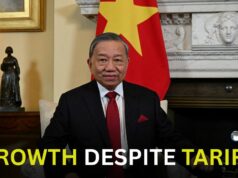China’s Communist Party is 103 years old today, with membership expected to hit a staggering 100 million by the end of this year. It was 99 million last year, according to The South China Morning Post, and members are more educated with around 56% or 55.7 million having a college degree or more.
But membership is also slowing. It was 1.4% two years ago and 1.2% now. Women are underrepresented, also ethnic minorities although party apparatchiks will point to 88,300 women and over 14,000 ethnic minority members. But in the ranks of the higher leadership, women are few. The Politburo for instance, has 24 men and no women.
For President Xi Jinping, who is also the party general secretary, it was an opportunity to reach out to his huge family, to encourage and advise. He called for “comprehensive and strict governance over the party”, urging effective organisation through a centralised and unified leadership.
He said the party’s grassroots organisation must be reformed to increase local governance ability and internet and information technologies should be applied to party building to achieve full coverage of the organisation, offline or online.
According to reports in the Chinese media, cities like Beijing and Shanghai have seen a surge in visitors eager to learn more about the party’s founding and its subsequent development. Exhibits in these museums showcase the party’s early struggles, its role in China’s progress, and its achievements in modernising the country.
Reports from Beijing say people are participating in various activities to celebrate the anniversary. Attending lectures and seminars, reciting the party oath, and volunteering in community service projects are seen as fostering a sense of pride and unity among Chinese citizens.
Above all, it is about binding the Communist Party to the people, seeking to emphasise how the two are indivisible and the country’s future progress is inextricably linked to continued rule by the party.
Research Associate at StratNewsGlobal, A keen observer of #China and Foreign Affairs. Writer, Weibo Trends, Analyst.
Twitter: @resham_sng





